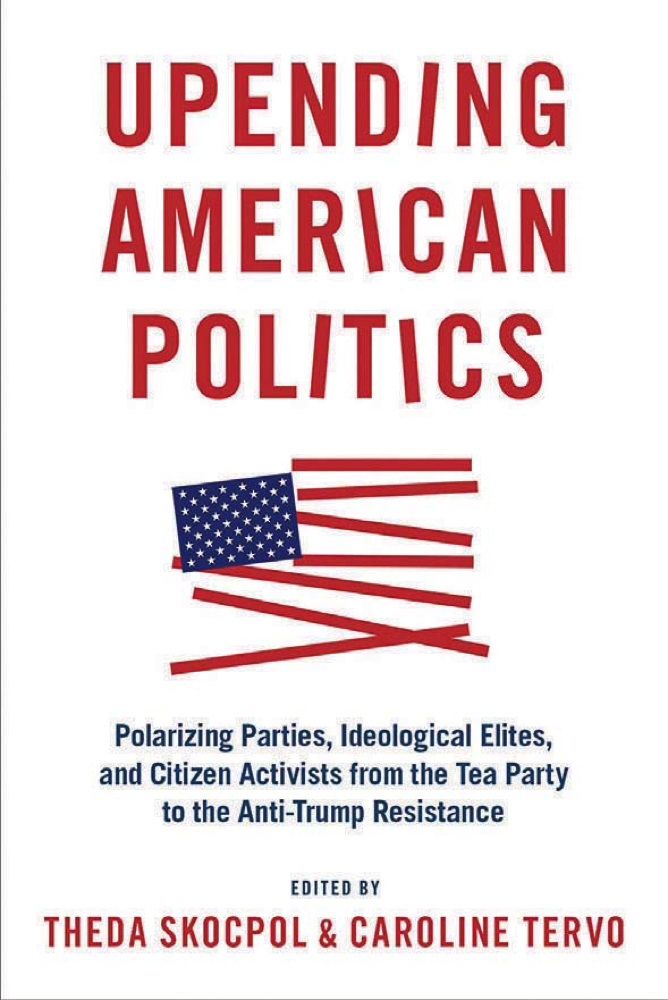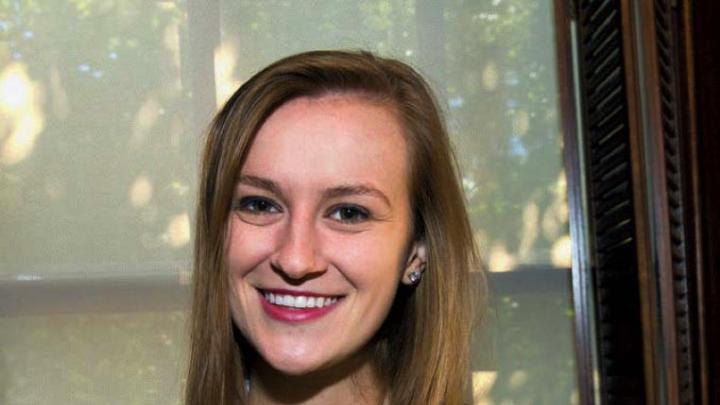Among the many ways U.S. politics has been transformed in the past decade, the rise of nationwide citizens’ activist groups devoted to resisting a president—the Tea Party on the right, and Indivisible on the left—has been especially remarkable. These groups reflect both the renewed grass-roots energy animating civic-minded Americans, and the severe polarization that now frames seemingly every dimension of national politics. A new book released this January, edited by Thomas professor of government and sociology Theda Skocpol and Caroline Tervo ’18, presents fresh, scholarly essays exploring these movements.

Upending American Politics: Polarizing Parties, Ideological Elites, and Citizen Activists from the Tea Party to the Anti-Trump Resistance (Oxford University Press) is itself from the grass roots, in a sense: it includes work by five recent undergraduate thesis writers advised by Skocpol, one current undergraduate, and three current Harvard graduate students. Their contributions reflect an impressive breadth of fieldwork in politically important states. The book began to come together last March, Tervo explained in an interview, just after the class of 2019 completed their theses: “Theda was looking around and I was looking around, realizing that there had been a lot of interesting and important research done that added up to a coherent story of American politics over the last decade.” Much of that story is about the role of extra-party organizations—groups other than the two major political parties—in shaping policy and re-ordering the American political landscape. These developments, and particularly the election of President Donald Trump in 2016, “have flummoxed many observers of American politics, including political scientists and sociologists,” Skocpol and Tervo write. “Established perspectives such as median voter theory—the idea that parties will lean to the middle and avoid polarizing extremes—are misleading at best when applied to recent U.S. developments.”
“Most political scientists who study U.S. politics rely these days on national social surveys or election data or data about votes in Congress,” Skocpol wrote in an email. “We use all those kinds of information, but are also reviving some field and interview methods of the kinds all social scientists used to use–go out and look and talk to people. I learned in my Tea Party work a few years ago that there is no substitute for that when you are trying to understand breaking, new developments” (see “Tea Party Passions,” January-February 2012, page 8). Tervo’s chapter, for example, based on her senior thesis on her home state, North Carolina, draws on field interviews she conducted with local conservative and progressive activists. “The craft brewery was where the local Indivisible group met,” she notes, “and the Olive Garden and the IHOP are where the local Tea Party groups met.”
Tervo, her classmate Sally Marsh, and three members of the class of 2019—Alexandra Caffrey, Maximilian Frank, and Sophia Young—adapted their senior theses for chapters in Upending American Politics. Within weeks of turning in their theses, the 2019 graduates had to edit their texts down to short, jargon-free chapters accessible to non-specialist readers. (“That’s very, very impressive to me,” Tervo says. “I know when I submitted my thesis, I wanted to wash my hands of it.”)
For Caffrey, “The combination of a bunch of senior theses and people who are younger academics or not academics at all...getting to write about the current political era with a renowned political scientist like Professor Skocpol is a really cool, different thing. I’m really excited to see what [the book] does.” Skocpol says it’s “not usual for undergraduate work to be published this way, but I was delighted we could pull this off in just a few months, to get this timely work out for this year’s pivotal U.S. election season….We want all educated citizens, policymakers, students, and political analysts trying to make sense of current U.S. politics to read our work and use it as they can.”
Tervo’s contribution examines how the Republican-dominated legislature in her home state moved far to the right, enacting policies that are unpopular with most residents, like refusing federal funds to expand Medicaid. She first became interested in these questions when, as a high-school student in Wilmington, she watched the passage of highly contentious policies like an extensive 2013 voter ID law. “I remember a general sense of bewilderment among a lot of people about how these policies were happening, what was driving them, why now?” she says.
To answer these questions, Tervo, now a research coordinator in Harvard’s government department, looked at how strong conservative organizational networks linked grass-roots activists, like members of the Tea Party that emerged in 2009 in opposition to Barack Obama’s presidency, with elite right-wing institutions like the Koch brothers-backed Americans for Prosperity-North Carolina (AFP-NC). These connections, she writes, “helped them jointly fashion a policy pipeline that capitalizes on each organization’s unique strengths.” For example, she continues:
If the Locke Foundation produces a new report on wasteful government spending, AFP-NC holds a rally about this issue at the General Assembly and encourages activists to contact lawmakers in support of a bill that reduces spending. In turn, Civitas sponsors a poll surveying the attitudes of North Carolinians about “wasteful government spending,” holds a Raleigh luncheon where lawmakers are invited to learn the results, and proceeds to attack Democrat-enacted legislation for embodying such spending.
Conservative political activism in North Carolina has had the seemingly paradoxical effect of energizing participation in democracy while producing policies that are unpopular with most residents. “It’s very easy to assume that whatever’s most popular is going to happen or be protected or be passed into law, but that’s not actually how American politics works and American democracy works,” she says. “If you are an organized, active minority, you’re going to be able to have sway in ways that maybe a disorganized general majority will not....An interesting opportunity for all of us is to think about how those forces are in tension, and maybe think more critically about what structures would look like that are enhancing of a little-D democratic system and would better represent the voices of a lot of people.”
Caffrey’s chapter, “From Obama Victories to a GOP Edge in Florida,” tells a story about that state that is in some ways similar to Tervo’s on North Carolina. After candidate Obama’s field organizing across Florida in 2008 and 2012 demonstrated the potential of grass-roots campaigning, she writes, “Florida Republicans have become the ‘Obama-ites’ in their campaign strategy...they have literally read the Obama organizing textbook and implemented a systemic strategy that invests in sustained grass-roots organizing. In the same period, Florida Democrats have allowed their own grass-roots organizing system to fall into disarray.” Accordingly, Florida resisted the blue wave that swept much of the country at 2018’s midterm elections, despite some pockets of effective Democratic organizing. (Caffrey now works for former Florida gubernatorial candidate Andrew Gillum’s organization, Forward Florida Action, which aims to build progressive organizing infrastructure there.)
The research throughout Upending American Politics strives to be objective and nonpartisan, but Skocpol and Tervo are also clear about what they see as the stakes of this year’s presidential election. “Will American voters in 2020 and beyond reconfirm the Trump-GOP’s fusion of white ethnic defensiveness with ultra-free-market governance?” they ask in conclusion. “Or will they repudiate that synthesis and redirect the country toward a future where governments at all levels further social inclusion and greater economic equality?” The answer, the book suggests, depends on how proficient progressives are at organizing.









